Linda Rodriguez's Blog, page 16
December 10, 2012
Every Broken Trust, the next Skeet Bannion novel
 The next Skeet Bannion novel, Every Broken Trust, is available for pre-order now and will launch May 7, 2013.
The next Skeet Bannion novel, Every Broken Trust, is available for pre-order now and will launch May 7, 2013.Pre-order here.
I'm excited about this latest in Skeet's adventures and about the gorgeous cover my publisher has given me again. And I'm absolutely thrilled about the blurbs Every Broken Trust has received from two super writers for whom I have so much admiration!
"Linda Rodriguez gives readers a truly modern heroine in tough, independent, and complex police chief Skeet Bannion. Add powerful writing, edge-of-your-seat suspense, and a cast of characters you won't want to leave behind and Rodriguez delivers another terrific read."— Deborah Crombie, New York Times bestselling author of No Mark Upon Her
“Linda Rodriguez is a richly talented writer. Her aim is true, and she strikes deep. This new work will reward you as it weaves its generous spell. Good stuff. Get it now.”— Luis Alberto Urrea, bestselling author of The Hummingbird’s Daughter and Queen of America
Am I a truly fortunate writer, or what?
Life has settled into routine for half-Cherokee Marquitta “Skeet” Bannion now that she’s gained custody of fifteen-year-old Brian Jameson and shares care for her stroke-impaired father with her ex-husband—until the past reaches out to destroy everything she holds dear.
A party to celebrate the arrival in Brewster, Missouri, of George Melvin, a Kansas City politician accompanied by his troubled teenage daughter, wealthy wife, even wealthier backer, and mysterious employee, rapidly turns into disaster when Skeet’s best friend, Karen Wise, stumbles on a body in Chouteau University’s storage caves and is attacked herself. Skeet works to ensure Karen safety, even as Karen becomes obsessed with the dead man’s drunken claim that her husband’s accidental death years earlier was murder.
Brian’s emotional entanglement with the rebellious daughter and Karen’s fixation on the politician as her husband’s murderer frustrate Skeet’s efforts to keep them both safe and out of trouble while she tracks down the killer, who’s targeting Karen to remove a potential witness. Even Skeet’s friends and neighbors in Brewster keep secrets from her, and Skeet wonders if any of them are what they seem.
Not knowing who she can trust any longer, Skeet struggles against the clock to solve a series of linked murders stretching into the past before she loses Brian forever and her best friend winds up in jail—or dead.
I've been very tough on Skeet in this book. As I’ve said before, I really envision the series of “Every” books as one giant meta-novel about Skeet’s growth and development (and, occasionally, failures) as she works through the issues surrounding her personal development book by book. Each mystery story, complete in itself, will be one more chapter in the story of Skeet as she becomes the really remarkable person her grandmother has always known she would be.
Skeet has built a new family to take the place of the mother and father who had (in her eyes) failed her. I wanted to put her in a situation where Karen and four-years-dead Jake, who had been her parental surrogates, as well as Brian, her new son, and Joe, whom she considered a possible mate, would all betray her trust in some way or another. I wanted to see how she would cope with these various large and small betrayals that would also threaten her with the actual loss of Brian and Karen.
I hope to get permission soon to post the first chapter or some other excerpt from the book here for you to read and get a taste of it.We're into the countdown now until Every Broken Trust is released into the world. So a little celebration's in order here. Chocolate for everyone!
Published on December 10, 2012 10:47
November 26, 2012
Lucha Corpi--Crossing Borders and Boundaries
 [NOTE: I was without a computer for almost two weeks, which is the reason for the absence of posts on this blog recently.]
[NOTE: I was without a computer for almost two weeks, which is the reason for the absence of posts on this blog recently.]I have wanted to feature award-winning and groundbreaking writer, Lucha Corpi, on my blog for a long time. Well-known within the Chicano-Latino literary community, I'd love to see her find an enthusiastic audience in the larger literary world, as she deserves. She is the perfect writer to combine both of my longtime series, Books of Interest by Writers of Color and Literary Mystery Novelists. Although we've never met in person, Lucha and I also share certain aspects of our backgrounds, as you will see in this interview.
Lucha Corpi Bio
Born in Jáltipan, Veracruz, México, Lucha Corpi was nineteen when she came to Berkeley as a student wife in 1964. Corpi is the author of two collections of poetry: Palabras de mediodía/Noon Words and Variaciones sobre una tempestad/Variations on a Storm (Spanish with English translations by Catherine Rodríguez Nieto), two bilingual children’s books: Where Fireflies Dance/Ahí, donde bailan las luciérnagas and The Triple Banana Split Boy/El niño goloso. She is also the author of six novels, four of which feature Chicana detective Gloria Damasco: Eulogy for a Brown Angel, Cactus Blood, Black Widow’s Wardrobe, and Death at Solstice. Corpi has been the recipient of numerous awards and citations, including a National Endowment for the Arts fellowship in poetry, an Oakland Cultural Arts fellowship in fiction, the PEN-Oakland Josephine Miles Award and the Multicultural Publishers Exchange Literary Award for fiction, and two International Latino Book Awards for her mystery fiction. Until 2005, she was a tenured teacher in the Oakland Public Schools Neighborhood Centers.
For those new to your series, can you describe the Gloria Damasco mysteries?
Each of the four crime novels in my Gloria Damasco series has as backdrop the history, politics, and culture of Chicanos-as/Mexicans in the U.S. but particularly in California, up to and including the Chicano Civil Rights Movement of the 60’s and 70’s. During her first investigation, Gloria discovers that she has a “dark gift.” She’s a clairvoyant. But she has always insisted on being guided by her reason not her intuition, so she does the leg work any detective would to solve the crime—if only to prove to herself that indeed her “dark gift” is real. In the first two novels, she also teams up with private detective Justin Escobar, under whom she apprentices to obtain her own P.I. license.
Gloria Damasco is considered by some critics and scholars as the first Chicana private detective in American literature. I suppose that means that Gloria is the first fictional woman detective to be deeply rooted in Chicana-o/Mexican culture in the U.S. But to me, Gloria is my sister, dark gift and self-doubt included. And I am glad to be her hand: her “ghost writer.” We first met on a scary night during one of my sojourns in the Sierra Nevada in 1989, where I’d gone to finish a poetry manuscript already due at the publisher. (Like you, Linda, I am one of those poets who’ve turned from “rhyme to crime.”) It was there and then I wrote the opening line of Eulogy for a Brown Angel, “Luisa and I found the child, lying on his side in a fetal position.”
Eulogy for a Brown Angel (1992) has as historical background the events during and after the National Chicano Moratorium peaceful march and subsequent riot in East Los Angeles in 1970. Finding a little boy dead on a sidewalk as the riot rages on sends Gloria on a long personal quest to find his murderer. Her investigation leads to the story of the Peralta family in Oakland, Gloria’s hometown. It takes her from East L. A. to Oakland, and finally to the Napa Valley, where the violent conclusion takes place. At its very core, Eulogyis also a study on racism, from its most socially blatant and destructive public displays to its more subtle manifestations within the Mexican American family as well.
Cactus Blood (1995) begins in Oakland with the “apparent” suicide of a Chicano poet, who had been involved in the United Farm Workers and Grape Boycott back in 1973, as had two of his friends who are missing. Gloria and Justin discover that the disappearance of the two and the possible murder of the third revolve around an incident involving the rape and pesticide poisoning of an undocumented Mexican girl 16 years before. The investigation leads them to the San Joaquin Valley, then to an old Native American ghost dancing site in Sonoma, the Valley of the Moon, in their search for a ritualistic killer.
In Black Widow’s Wardrobe, (1999) Gloria, her mother and daughter take part in San Francisco’s traditional Day of the Dead procession. On the way back to their car, they witness first an attempt on the recently-released convicted killer Licia Lecuona, aka Oakland’s notorious “Black Widow,” and then the seemingly coincidental bizarre abduction of a young woman by two costumed riders on horseback. Gloria looks into both disturbing incidents. A second attempt on Black Widow’s life is made, and she’s hired to protect Licia. Her investigation and her client’s willfulness lead them both down a dangerous path from the misty and familiar S.F. Bay Area to the remote Sierra de Tepoztlán near Cuernavaca, and back in time to the mysterious death of the legendary, historical figure: La Malinche.
 How would you describe Death at Solsticeto someone who has not read any of your previous novels?
How would you describe Death at Solsticeto someone who has not read any of your previous novels? In 2009, I celebrated my forty years as a poet and writer, and my twenty-year relationship with Gloria Damasco and which culminated with the publication of Death at Solstice. In her latest adventure, Gloria is hired by the owners of the Oro Blanco winery in California’s Shenandoah Valley, in the heart of the legendary Gold Country. She investigates the theft of a pair of emerald earrings rumored to have belonged to Carlota, Empress of Mexico. Anonymous notes, mysterious accidents, and the sightings of a ghost horse thought to have belonged to the notorious Gold Rush Era bandit Joaquin Murrieta soon have Gloria struggling to fit together the pieces of this puzzle. The disappearance of a young woman, a saint, supposedly able to perform miracles, and the gruesome murder of her nurse send Gloria on a fateful journey that ends in gun play and tragedy at a Witches’ Sabbath on the night of the summer solstice.
You had achieved critical acclaim as a poet. What inspired you to write your first novel? What was your inspiration for this series?
To answer this question, I have to go back to my hometown, a small tropical village in the southern half of the state of Veracruz, where I spent my formative years. I consider myself quite fortunate to have been born into a community that fostered both the creation and performance of poetry and music, and the art of storytelling. I was also lucky to be a daughter to parents who believed in educating the girls in a family. My sister and I received a comparable education to that of our brothers, and the best education my parents could afford. Also, by accident, I started primary school when I was four years old and by age seven I could read very well. To keep me challenged in reading, my teacher asked me to memorize poems and began to instruct me in the recitation—declamation—of poetry.
That same year, my father underwent a cornea transplant and had trouble reading the newspaper. He asked me to read to him from any page in the newspaper except La página roja—the crime page. I was seven years old, so my father went to great lengths to remove the red page and hide it from me. But he didn’t destroy it right away, so I usually found it and read it. La página described knifings, fights in the sugar cane fields, other brawls and bloody accidents, in all their gory details. I soon tired of reading those repetitive news reports. But my curiosity grew the first time I read about and followed the case of a woman who had unsuccessfully tried to poison her husband. I fell in love with the kind of story, in which it was evident that there was someone’s “intelligence” behind the crime, and someone else’s matching “wits” to bring the criminal to justice—aka the detective story. But it wasn’t until 1989 that I undertook the research for my first mystery novel, months before I met Gloria Damasco, the detective who would need access to all that knowledge at a moment’s notice to do her job.
What's your writing process? What is a typical writing day like for you? Do you keep to a set schedule? What are your writing habits?
I usually begin research for a crime novel about ten months before I actually sit down to write. I do not write a synopsis of the novel, but I do begin with a list of subjects and topics to research, books to read, activities to experience in person, and very frequent visits to other sites and locales where the action will take place. I only intuitively know that this information is important, but it isn’t until I do the actual writing, (keeping my butt on the seat long and often enough to get it done), that I discover how those elements fit into the plot. My personal style of writing is one of discovery, of being open to surprises, allowing myself to let the characters reveal themselves as they see fit, and let my detective guide me as the investigation develops. My role is to tell the best story I can, with no personal agenda of my own, and my best effort not to manipulate content or character. I make sure the characters, even the minor ones, are seen in their many dimensions, that the plot is solid and every detail or question raised is accounted for or answered to my satisfaction by the end of the story.
During most of the years I was writing long fiction, I was also a full-time teacher in the Oakland Public Schools’ Neighborhood Centers, a ten-hour-six-day-a-week job. I was also a single mom. I have been as passionate about teaching as about writing and motherhood, all creative endeavors. Creativity, however, does not spring eternal and its well is not bottomless. Teaching and parenthood took a lot of my time and creative energy. But writing helped me to find my spiritual and psychological equilibrium because it was the only endeavor that was mine and for my benefit only. I could not dispense with it anymore than with breathing or eating. So I made the time to write, which was two hours, from five to seven in the morning every day, including holidays. A summer off to write six hours a day was a luxury. Obviously, I am addicted to writing, and I simply refuse to find myself one of these days in my deathbed saying, “I could have written.” So in 2005, after 31 years, I decided to retire from teaching, devote to writing and family, finally enjoy a social life and put more effort into promoting my work.
Although I still write long fiction early in the morning, I’ve found that other kinds of writing require a certain…je ne sais quoi…“mood or ambience” perhaps? Before I began to write fiction, I was strictly a poet for ten years, and my writing time was from ten to midnight every night. Now, I am in the process of writing a collection of personal essays, The Orphan and the Bookburner. For inexplicable reasons, I have to write each piece in the early evening, between 5 and 8 p.m. And, I must listen to Jazz while writing it, perhaps because it is the best kind of music to sooth my spirit while I explore “the truth” about self and family, my life as an immigrant, and other painful experiences.
What projects, literary or otherwise, are occupying you at the moment?
After my mother died two years ago, I began to realize how important it is for all of us and our children to have a sense of continuity (history) and connectivity (family and community). In the U.S. individuality is sometimes taken to dire and/or tragic extremes. The essays in the collection are meant to offer my grandchildren access to the bridges spanning generations and cultures, and to the languages that give them voice, so they may freely redefine who and what they are. Writing personal essay has been much harder for me than writing short or long fiction. And it’s been the source of many a nightmare. Truth be told, I’d rather do a little murder in black and white and sleep like a baby. But I’ve promised myself to have a final draft by my birthday next spring. When this book walks out of my life to find its own destiny, I’ll go back to reading for my own pleasure, so essential for any writer and poet, young or established, to thrive and continue learning the craft. And every night, round midnight, walk back into the embrace of my life-long lover: poetry.
Later this week, I'll catch up this blog with photos and descriptions of recent travels and events and the dramatic tale of my computer woes--which has a happy ending because I have a generous and talented oldest son.
Published on November 26, 2012 14:25
November 4, 2012
A Rich, Full Life
Since I came home from Bouchercon, the world mystery conference, I've been running from one event to another while also trying to meet several freelance deadlines and finally dealing with copy edits on
Every Broken Trust
, my next Skeet Bannion novel due to be published in May 2013 (now available for pre-orders).
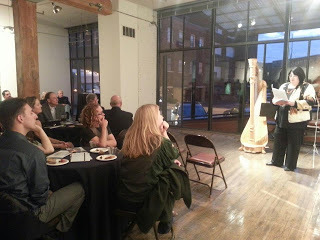 Opening Alliance of Artists Communities nat'l conferenceImmediately after the drive home from Cleveland, I led a writing workshop for 65 high school seniors at Johnson County Community College. Next, I did a literary festival, gave a reading in The Writers Place series at the Johnson County Resource Library, hosted a visiting writer friend for her KC event, presented a session at a writers conference in Lenexa, KS, headlined a NaNoWriMo conference in Harrisonville, MO, and did a book signing at the Kansas City Store on the Plaza.
Opening Alliance of Artists Communities nat'l conferenceImmediately after the drive home from Cleveland, I led a writing workshop for 65 high school seniors at Johnson County Community College. Next, I did a literary festival, gave a reading in The Writers Place series at the Johnson County Resource Library, hosted a visiting writer friend for her KC event, presented a session at a writers conference in Lenexa, KS, headlined a NaNoWriMo conference in Harrisonville, MO, and did a book signing at the Kansas City Store on the Plaza.
This week began with the arrival of the copy edits for Every Broken Trust, needing to be turned around quickly, a deadline for two major freelance projects, and a poetry reading to kick off the national conference of the Alliance of Artists Communities, a fabulous organization I'm proud to have worked with for some time. Because of all the deadlines, I missed the sessions of the conference I had hoped to attend. A real loss for me since I've attended it before and know what a remarkable, creative conference this is!
Friday, having finished the copy edits and met my freelance deadlines, I headed to Topeka, KS, for an author event at the Topeka Library in the afternoon (they were hosting a conference of Kansas librarians) and to join fellow Latino Writers Collective members and old friends, Jose Faus and Gabriela Lemmons, to give a poetry reading at the Dia de los Muertos Festival that evening. It was so much fun doing these Topeka gigs! I have lots of family and friends there, and my sister and her best friend came to the library event and hung out with Ben and me all afternoon. Then, we drove to the arts district in North Topeka, where the Day of the Dead Festival was being held. There I encountered my sister-in-law and niece and three of my cousins-in-law, and we were joined by my nephew and his girlfriend, as well as by a couple who have been friends of Ben's and mine for many years. Old home week!
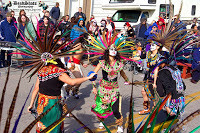
The evening festivities with our poetry reading were the final events in a festival that brought weeks of art exhibits and workshops, musical performances, children's programs, and incredible traditional dance performances to the Topeka community. This was the first year for this celebration, but it was large, multifaceted, and extremely successful.
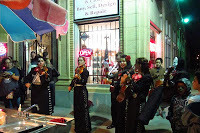 We read poetry to an attentive standing-room-only audience (including a state judge and a city council member) in a gallery with Day of the Dead art and ofrendas, altars filled with remembrances of deceased loved ones, and ate pan dulce (Mexican pastries) and drank Mexican hot chocolate afterward while calaca mariachis strolled the street outside serenading passersby.
We read poetry to an attentive standing-room-only audience (including a state judge and a city council member) in a gallery with Day of the Dead art and ofrendas, altars filled with remembrances of deceased loved ones, and ate pan dulce (Mexican pastries) and drank Mexican hot chocolate afterward while calaca mariachis strolled the street outside serenading passersby.
After a late supper with extended family and a good night's rest, Ben and I raced to Kansas City to arrive at Mysteryscape, the newest independent bookstore in the Kansas City area, so I could participate in a reading and discussion celebrating the publication of Kansas City Noir , an anthology of short crime fiction. Editor Steve Paul led contributors, Catherine Browder, Nancy Pickard, and myself as we discussed the book, our individual stories, and the whole genre or phenomenon of noir fiction to another SRO crowd of enthusiastic members of the Border Crimes chapter of Sisters in Crime plus members of the general public. After a spirited question and answer session, we then signed books for about half an hour.
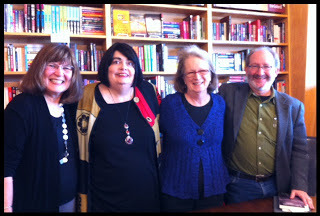
We are so lucky to have had a fine bookstore like Mysteryscape open in downtown Overland Park (a Kansas City suburb). I have friends in other parts of the country who've lost all their independent bookstores. We have Rainy Day Books, one of the best known indie bookstores in the country and a great treasure, Reading Reptile, a nationally known children's bookstore, The Raven, a great indie bookstore in Lawrence, Prospero's, a local chain of used bookstores that's also active in the author and book events scene. And now, we have Mysteryscape, as well. With its enthusiastic and savvy young owners who are extremely author- and community-supportive, I expect it to be quite successful and to be around for many years to come.
If you live in the Kansas City area and have never been to Mysteryscape, make a trip there next Saturday afternoon at 1:00 p.m. when I'll be interviewing Joy Castro, author of the award-winning literary memoir, The Truth Book, and her new critically acclaimed thriller, Hell or High Water. Joy is a professor at the University of Nebraska-Lincoln and her novel looks at a post-Katrina New Orleans where registered sex offenders have fallen off the radar, young women are being murdered, and a young reporter decides to investigate at the risk of her own life.
And now I'm off to more freelance deadlines, an author event at 6:00 p.m. on November 13 at the Rolling Hills Library in St. Joseph, MO, another at 1:00 p.m.on November 15 at the Platte City Study Club in Platte City, MO, and later in the month a trip to Providence, RI. I'll be writing a new book during this time also. At least, I'm never bored. When we get a little frazzled, Ben and I console each other with the thought that we're living rich, full lives.
 Opening Alliance of Artists Communities nat'l conferenceImmediately after the drive home from Cleveland, I led a writing workshop for 65 high school seniors at Johnson County Community College. Next, I did a literary festival, gave a reading in The Writers Place series at the Johnson County Resource Library, hosted a visiting writer friend for her KC event, presented a session at a writers conference in Lenexa, KS, headlined a NaNoWriMo conference in Harrisonville, MO, and did a book signing at the Kansas City Store on the Plaza.
Opening Alliance of Artists Communities nat'l conferenceImmediately after the drive home from Cleveland, I led a writing workshop for 65 high school seniors at Johnson County Community College. Next, I did a literary festival, gave a reading in The Writers Place series at the Johnson County Resource Library, hosted a visiting writer friend for her KC event, presented a session at a writers conference in Lenexa, KS, headlined a NaNoWriMo conference in Harrisonville, MO, and did a book signing at the Kansas City Store on the Plaza.This week began with the arrival of the copy edits for Every Broken Trust, needing to be turned around quickly, a deadline for two major freelance projects, and a poetry reading to kick off the national conference of the Alliance of Artists Communities, a fabulous organization I'm proud to have worked with for some time. Because of all the deadlines, I missed the sessions of the conference I had hoped to attend. A real loss for me since I've attended it before and know what a remarkable, creative conference this is!
Friday, having finished the copy edits and met my freelance deadlines, I headed to Topeka, KS, for an author event at the Topeka Library in the afternoon (they were hosting a conference of Kansas librarians) and to join fellow Latino Writers Collective members and old friends, Jose Faus and Gabriela Lemmons, to give a poetry reading at the Dia de los Muertos Festival that evening. It was so much fun doing these Topeka gigs! I have lots of family and friends there, and my sister and her best friend came to the library event and hung out with Ben and me all afternoon. Then, we drove to the arts district in North Topeka, where the Day of the Dead Festival was being held. There I encountered my sister-in-law and niece and three of my cousins-in-law, and we were joined by my nephew and his girlfriend, as well as by a couple who have been friends of Ben's and mine for many years. Old home week!

The evening festivities with our poetry reading were the final events in a festival that brought weeks of art exhibits and workshops, musical performances, children's programs, and incredible traditional dance performances to the Topeka community. This was the first year for this celebration, but it was large, multifaceted, and extremely successful.
 We read poetry to an attentive standing-room-only audience (including a state judge and a city council member) in a gallery with Day of the Dead art and ofrendas, altars filled with remembrances of deceased loved ones, and ate pan dulce (Mexican pastries) and drank Mexican hot chocolate afterward while calaca mariachis strolled the street outside serenading passersby.
We read poetry to an attentive standing-room-only audience (including a state judge and a city council member) in a gallery with Day of the Dead art and ofrendas, altars filled with remembrances of deceased loved ones, and ate pan dulce (Mexican pastries) and drank Mexican hot chocolate afterward while calaca mariachis strolled the street outside serenading passersby.After a late supper with extended family and a good night's rest, Ben and I raced to Kansas City to arrive at Mysteryscape, the newest independent bookstore in the Kansas City area, so I could participate in a reading and discussion celebrating the publication of Kansas City Noir , an anthology of short crime fiction. Editor Steve Paul led contributors, Catherine Browder, Nancy Pickard, and myself as we discussed the book, our individual stories, and the whole genre or phenomenon of noir fiction to another SRO crowd of enthusiastic members of the Border Crimes chapter of Sisters in Crime plus members of the general public. After a spirited question and answer session, we then signed books for about half an hour.

We are so lucky to have had a fine bookstore like Mysteryscape open in downtown Overland Park (a Kansas City suburb). I have friends in other parts of the country who've lost all their independent bookstores. We have Rainy Day Books, one of the best known indie bookstores in the country and a great treasure, Reading Reptile, a nationally known children's bookstore, The Raven, a great indie bookstore in Lawrence, Prospero's, a local chain of used bookstores that's also active in the author and book events scene. And now, we have Mysteryscape, as well. With its enthusiastic and savvy young owners who are extremely author- and community-supportive, I expect it to be quite successful and to be around for many years to come.
If you live in the Kansas City area and have never been to Mysteryscape, make a trip there next Saturday afternoon at 1:00 p.m. when I'll be interviewing Joy Castro, author of the award-winning literary memoir, The Truth Book, and her new critically acclaimed thriller, Hell or High Water. Joy is a professor at the University of Nebraska-Lincoln and her novel looks at a post-Katrina New Orleans where registered sex offenders have fallen off the radar, young women are being murdered, and a young reporter decides to investigate at the risk of her own life.
And now I'm off to more freelance deadlines, an author event at 6:00 p.m. on November 13 at the Rolling Hills Library in St. Joseph, MO, another at 1:00 p.m.on November 15 at the Platte City Study Club in Platte City, MO, and later in the month a trip to Providence, RI. I'll be writing a new book during this time also. At least, I'm never bored. When we get a little frazzled, Ben and I console each other with the thought that we're living rich, full lives.
Published on November 04, 2012 21:35
October 29, 2012
The Next Big Thing
One of the nicest things about writing novels for a living is the abundance of fine people who are your colleagues. Alyx Morgan, who was one of my blog partners at the Writers Who Kill blog, tagged me in this blog chain of novelist bloggers that features our work-in-progress.
http://morganalyx.wordpress.com/
What is the working title of your book?
Every Broken Trust is the final title of my next book. Every Broken Trust will be published by St. Martin’s Press/Minotaur Books May 7, 2013. It’s already available for pre-order. It has a beautiful cover already, but I’m not allowed to publicize it yet because the publisher may decide to put a blurb on the cover before they use it.
http://www.amazon.com/Every-Broken-Trust-A-Mystery/dp/1250030358
Where did the idea come from for the book?
I wanted to put my protagonist Skeet Bannion into a situation where she would fear losing the people she most loves and where she would learn some empathy for her own family members who disappointed her in her youth.
What genre does your book fall under?
Every Broken Trust is a mystery. I find the genre of crime fiction allows me great leeway to write about almost any topic or situation that I find intriguing.
Which actors would you choose to play your characters in a movie rendition?
I’m not going to be good at this because most of the actors I’ll think of are too old now to actually play these roles. I need to learn more about younger actors, I guess.
For Skeet Bannion, I would cast Angie Harmon or a younger Sandra Bullock. Joe Louzon, the Brewster, Missouri, chief of police who’s romantically interested in Skeet, would be a younger Val Kilmer, back when he was still fit. Sam Musco, Skeet’s ex-husband, would be Don Johnson in his Miami Vice days. Sam’s a Sonny Crockett-type who’s trying to change so he can win back Skeet. For Skeet’s best friend and mentor, Karen Wise, I’d cast the mature Phylicia Rashad. Brian, Skeet’s adoptive son, would be played by Austin Ward or Sterling Beaumon. A new character that just walked into this book is Terry Heldrich, cast as Johnny Depp.
What is the one-sentence synopsis of your book?
Not knowing who she can trust any longer, Skeet struggles against the clock to solve a series of linked murders stretching into the past before she loses Brian forever and her best friend winds up in jail—or dead.
Will your book be self-published or represented by an agency?
My wonderful agent is Ellen Geiger of the Francis Goldin Literary Agency. Every Broken Trust will be published by St. Martin’s Press/Minotaur Books on May 7, 2013.
How long did it take you to write the first draft of your manuscript?
I wrote the first draft of Every Broken Trust in four months and then spent six months revising and editing it before sending it on to my agent and editor.
What other books would you compare this story to within your genre?
I write complex, character-driven books as Julia Spencer-Fleming, William Kent Krueger, and Deborah Crombie do. My strong female protagonist has been compared by reviewers to Sue Grafton’s Kinsey Millhone, Sara Paretsky’s V.I. Warshawski, and Nevada Barr’s Anna Pigeon.
Who or what inspired you to write this book?
I already had my protagonist and the situation in which she was left at the end of Every Last Secret, my first novel in this series. A newspaper article about a new federal taskforce in Kansas City, a PBS special, and an essay about a social problem all combined to bring the book to life. I won’t describe any of them further because it might spoil the book for my readers.
What else about your book might pique the reader’s interest?
Skeet’s Gran (who is based on my own beloved grandmother who died when I was thirteen) begins to play a slightly larger role in this book. I’ve been very tough on Skeet in this book because she needs to grow as a person.
I’ve passed this blog chain challenge on to my colleagues and fellow writers below. Please visit their blogs next week and see how they’ve answered these same questions and what’s their next big thing.
Debra H. Goldstein http://www.debrahgoldstein.com/dhgblog.html
Jenny Milchman http://www.jennymilchman.com/blog/
Joyce Tremel http://joycetremel.blogspot.com/
Judy Hogan http://postmenopausalzest.blogspot.com/
Published on October 29, 2012 12:45
October 26, 2012
Literary Mystery Novelists--Jeri Westerson
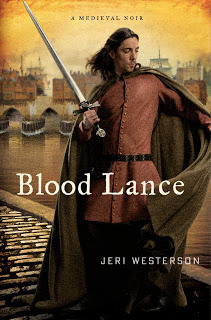 Jeri Westerson has published five Crispin Guest medieval noir novels. What is "medieval noir" you may well ask? In Westerson's books, "medieval noir" marries impeccable historical research, finely wrought characters, and intricate plotting with a fallen hero trying to survive with honor in the gritty streets of 14th century London's underbelly told with the sensibility of another Chandler or Hammett.
Jeri Westerson has published five Crispin Guest medieval noir novels. What is "medieval noir" you may well ask? In Westerson's books, "medieval noir" marries impeccable historical research, finely wrought characters, and intricate plotting with a fallen hero trying to survive with honor in the gritty streets of 14th century London's underbelly told with the sensibility of another Chandler or Hammett.Disgraced knight, Crispin Guest, is one of the more complex and fascinating characters out there. Totally a creature of his medieval time period and culture, he is nonetheless kin to modern noir heroes such as Sam Spade, Chandler's man of honor with a contempt for pettiness. Westerson has been lauded for these books by reviewers and readers alike, with more than her share of starred reviews and major award nominations.
In Blood Lance, Crispin investigates the death of an armourer and winds up in a search for the Spear of Longinus in conjunction (or possibly competition) with his old friend Geoffrey Chaucer.Caught between rebellious factions in King Richard’s court, an old friend’s honor, and the true ownership of the spear, it all culminates in a deadly joust on London Bridge.
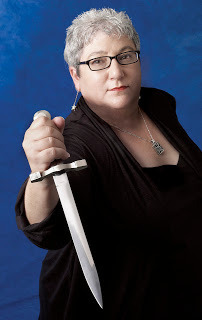
Jeri Westerson Bio
Raised in a household that not only embraced history, but medieval English history specifically, Jeri came by her interest in all things medieval honestly. She worked in a bevy of careers prior to setting her sights on becoming a novelist. Would-be actress, graphic artist, theology teacher, tasting host and tour guide for a winery, and newspaper reporter were among them.
Her critically acclaimed medieval noir series began with VEIL OF LIES, which garnered nominations from the Mystery Reader’s Journal Macavity Award for Best Historical Mystery and the Private Eye Writers of America Shamus Award for Best First PI Novel, the first medieval mystery to be so honored. The next in the series, SERPENT IN THE THORNS, garnered more mystery award nominations. The third, THE DEMON’S PARCHMENT, took yet more nominations from awards committees, including RT (Romantic Times) Reviewers’ Choice Award. Library Journal gave it a starred review whilePublisher’s Weekly declared it “the best yet in the series!”
The fourth Crispin Guest mystery, TROUBLED BONES, was released in October 2011 and out of the gate received a nomination for the RT Reviewer’s Choice Award. It finaled for the Agatha, the Bruce Alexander Award, and the Macavity, giving it four nominations. Publisher’s Weekly said of the fifth in the series BLOOD LANCE; “Clever twists and convincing period detail make Westerson’s fifth 14th-century historical featuring disgraced knight Crispin Guest one of her best.” Kirkus Review said, “Guest’s fifth adventure again provides a lively tale of historical interest smoothly combined with a worthy mystery.” The Richmond Times-Dispatch said, “Written with a keen knowledge of medieval history, ‘Blood Lance’ is another riveting tale of honor and heroism, grounded in period detail, a wealth of action and the continued development of her characters.” Jeri looks forward to the sixth, SHADOW OF THE ALCHEMIST in the fall of 2013.
Jeri also has short stories in several anthologies: “Noodle Girl” in SHAKEN: STORIES FOR JAPAN, edited by Tim Hallinan; “Universal Donor” in the November release of MURDER AND MAYHEM IN MUSKEGO anthology, edited by Jon Jordan; “Mesmer Maneuver” in 2013′s Operator #5 serial anthology NIGHT OF THE INSURGENTS edited by Gary Philips. She has done talks around the country about the Middle Ages, demonstrating her cache of medieval weaponry. She has been a featured guest on the radio talk show Writers on Writing with host Barbara DeMarco-Barrett, and a guest lecturer at the Bowers Museum in Santa Ana. She is vice president for the southern California chapter of Mystery Writers of America and is also vice president of the Los Angeles chapter of Sisters in Crime, and co-chair for the California Crime Writer’s Conference for June 2013. She is also a member of Private Eye Writers of America and the Historical Novel Society. Jeri is married to a commercial photographer, has a screenwriter son, and herds two cats, a tortoise, and the occasional tarantula at her home in southern California.
Visit Jeri’s blog www.Getting-Medieval.com for articles on history and mystery as well as author interviews. Or see what Crispin has to say on his very own blog. She is also part of the group blog Poe’s Deadly Daughtersand you can follow her on Twitterand see what Crispin is up to on his Facebook page.
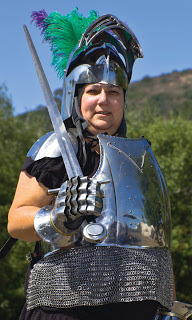
For those new to your series, can you describe the Crispin Guest mysteries? What was your inspiration for this series?How would you describe Blood Lance to someone who has not read any of your previous novels?
When I decided to write a medieval mystery series, I got it in my head to devise a hardboiled detective in a medieval setting, more or less like a medieval Sam Spade, since, at the time, I was reading a lot of Raymond Chandler and Dashiell Hammett. Chandler’s Philip Marlowe was styled as a “white knight,” a man who was led by his own code of honor. And I thought, why not a real knight under the same onus? So I took the tropes of the hardboiled detective—a lone wolf with a chip on his shoulder, hard-drinking, hard-talking, hard-fighting, and a sucker for a dame in trouble—and put him in the Middle Ages. I made him a knight with fighting training, a facility with languages, then took his title, lands, and wealth away so he’d have that chip on his shoulder with down and dirty backstory, and placed him on the mean streets of fourteenth century London where he has to eke out a living as a “Tracker,” a medieval PI, hired to find things. Some of those things turn out to be a murderer. I think it works well in the shadowy realm of medieval London. And each book features a religious relic or venerated object, something everyone wants to get their hands on or can’t wait to get rid of. There’s a lot of action, adventure, puzzles and twists, and even a bit of romance from the occasional femme fatale.
In Blood Lance, Crispin is coming home from a long day of investigating with coins in his money pouch for once, and as he’s passing London Bridge, he sees a person hurtling down from its heights into the churning Thames below. Like the knight he is, he dives in to save him, but when he gets to the man, he is already dead. When he confronts the people living on the bridge (and it is a city within a city with shops and houses) they claim that the dead armorer committed suicide, even the man’s fiancé. But Crispin knows murder when he sees it. And later, when Sir Thomas, an old friend of Crispin’s from his knightly days, comes calling on this armorer, Crispin discovers that the armorer was supposed to procure a special relic for the knight, a relic that would make him invincible in battle. But it’s missing. This relic is also wanted by another of Crispin’s old friends, the poet Geoffrey Chaucer, and Crispin is unable to determine if Chaucer wants it to do good or ill. Now Crispin is caught between rebellious factions in King Richard II’s court, Spanish spies, an old friend’s honor, and the true ownership of the famed Spear of Longinus, culminating in a deadly joust on London Bridge.
Who were your literary influences growing up?Are there any authors (living or dead) that you would name as influences?
Well, Geoffrey Chaucer for one. I grew up in a household that loved English history and so we had a child’s version of the Canterbury Tales (with some of the more juicier tales left out) and I loved it, along with all the other historical novels on our shelves. I read Anya Seton, Thomas B. Costain, Nora Lofts—all the greats, but I also became a Shakespeare groupie in high school as well as a Tolkien geek. Later, when I got caught up in mysteries, it was Dorothy Sayers, Ellis Peters, and Hammett, Chandler, and Dorothy Hughes.
What's your writing process? What is a typical writing day like for you? Do you keep to a set schedule? What are your writing habits?
I try to keep good writing habits, and with at least two series at once, you have to do that (I also write under the name Haley Walsh and pen a gay mystery series, the Skyler Foxe Mysteries.) I start around 7 am and do my blogging, emails, and Facebook. But by 9 it’s time to write. I outline every novel because I set myself a minimum of ten pages a day and I have no time to sit and stare at a blank page. I have to know where I’m going, even if I suddenly diverge from my original path in the outline. If I keep at it and don’t get diverted by Facebook or what’s on TCM that day, I write till about 3 pm. But sometimes I write a page or a few paragraphs and wander away. I read something or watch something on TV and then return to it. Sometimes my best writing comes at around 5 pm and goes on till 10. It’s when the Muse strikes, but I do try to keep to that ten page minimum. Theoretically, I would end up with a first draft in a month’s time, but it ends up being more like three months. Before I write a Crispin book, I have to take at least two to three months of researching and outlining first.
What projects, literary or otherwise, are occupying you at the moment?
Crispin #6, The Shadow of the Alchemist, is in the can. Soon I’ll be outlining Crispin #7, The Silence of Stones (for which we have to find a publisher), but I’m also working on a Young Adult series with Crispin’s young apprentice, Jack Tucker. Crispin found Jack when he was eleven years old, an orphaned cutpurse on the streets of London. Jack took a shine to Crispin and just wouldn’t leave, so Crispin reluctantly took him in as a servant, but he so endeared himself to Crispin with his bravery and intelligence that Crispin soon taught the lad to read and write and is in the process of training him as the next “Tracker.” Jack’s tales will be the stuff that happens when he disappears from Crispin’s side, with a stronger paranormal element and feature a strictly Jack-oriented adventure.
What inspired you to write your first novel and make it a historical novel? Had you always wanted to be a writer? Did you have a background as a medievalist?
I don’t have a history degree (my degree is in art) but I had that strong history interest growing up in my parents’ household, who were both English medieval history buffs. We had all sorts of books on the shelves from historical novels to history texts. But I never had any notion about being a writer. I first wanted to be an actress, but after some real world auditions in college, I decided the acting life was not for me. I turned to my other longtime interest, art, changed my major, and became a graphic artist for fifteen years in Los Angeles. In my childhood years, though, I always wrote stories for fun, and even wrote my first fantasy novel when I was sixteen (with the Jack Tucker tales, with their strong fantasy element, I’m really going back to my roots). For years after, I wrote novels for fun, novels no one else knew I wrote. It wasn’t until I semi-retired from graphic design to have a baby that I was forced to consider a new career (the entire graphics industry had turned to computers, and I had not!). So I thought of something I could do at home to raise my son and researched the publishing industry and thought, why not? How hard could it be? It turned out to be pretty hard. I wrote historical novels for ten years, never getting a break, until I switched from historical novel to medieval mystery. Then it all turned around.
Do you belong to a critique group of other authors?Do you find it helpful? In what ways?
I do. I joined Sisters in Crime around 2002 when I switched to mysteries and found a whole world of help, networking, and information. I was mostly involved in the online group of Guppies (the Great UnPublished, or Gups, guppies) and found my critique group there. I simply put out the call for other historical mystery writers and we virtually met. We live all over the country, from northern California to Oklahoma. I’ve only met one of them face to face. We communicate strictly online. It’s most helpful to have other eyes, eyes that know how to construct a mystery, people who will tell you the truth about your work. My agent will do that, too, but beta readers can work with you to get the kinks outbeforeI send it to my agent.
What is your advice to aspiring writers?How important is it for a young writer to be a reader? What would you recommend they read?
The best advice is to write a lot and to read a lot. Don’t just read in the genre you want to write in, but all sorts of things. Everything. You never know where inspiration will come from. I don’t know of any successful writer who isn’t a reader. And don’t give up. Keep trying to get that agent. Agents can get you all sorts of contracts. Where would I be without my foreign contracts?
What is the most surprising thing you’ve learned in your writing career? What has been the hardest part about being a writer?
The hardest part is that you put so much of your time, talent, and sweat into writing a book and you get so little back in return. And what I mean by that is that authors can seldom make a living in their chosen career. Editors and agents don’t need a second job, but you might. It’s a crime that this is the truth of publishing, but there it is. I do write full time, but my husband supports us.
Also, I spend a great deal of time on promotion. Even if you are published by a big New York publisher as I am, you will do the majority of promotion. It’s a shame that one cannot just write, but again, it’s the nature of the beast. And don’t rush to self-publish. I think you will be doing yourself a disservice. Perhaps there’s a reason you get rejections. Maybe your work isn’t quite up to snuff yet. Maybe you need to write something else. You lose a lot of opportunities—chances to get foreign sales, audio sales, and other contracts—by going it alone. Don’t be drawn in by the extremely small minority who make the papers and hit it big as self-published authors. Chances are that won’t be you. There are thousands more authors who make only a very few sales from their books as newbies.
Mostly, keep writing, keep reading, network with other authors by joining professional organizations like Sisters in Crime and Mystery Writers of America, and always, always, be professional.
Now don’t forget to check my website for info on my books, book discussion guides, Crispin’s blog and a cool series book trailer. www.JeriWesterson.com
For the Skyler Foxe Mysteries, go to www.SkylerFoxeMysteries.com
Published on October 26, 2012 07:22
October 21, 2012
What Kind of Imagination Do You Have?
 As a kid, I was a bookworm. I was the kid who constantly heard "Get your nose out of that book!" and "You're deaf, dumb, and blind when you've got your nose in a book!" I was the kid who carried extra books to school beyond all the heavy required texts. I was the kid who read ahead in the reading books to get to the end of the story.
As a kid, I was a bookworm. I was the kid who constantly heard "Get your nose out of that book!" and "You're deaf, dumb, and blind when you've got your nose in a book!" I was the kid who carried extra books to school beyond all the heavy required texts. I was the kid who read ahead in the reading books to get to the end of the story.Now, as an adult, I open a good novel at my family's and my to-do list's risk. I will disappear into the world of the book. My kids call it "Scorpio-ing." (I'm a Scorpio, and that sign is noted for its powers of concentration.) My youngest son has been known to jump up and down in front of his book-immersed mother, flapping his arms, to demonstrate to visiting friends how weird I am--though he and his sister inherited that ability to be swept up in an enthralling novel's world.

When I'm reading a good novel--classic, literary, mystery, science fiction, fantasy, makes no difference--the author's world and the people in it come alive for me, and I am living the book's story with them. I am experiencing that world and that story in a visceral way that is sometimes more real than the way I experience the quite-wonderful world of my daily life. I suspect I developed this ability as a survival mechanism in my dire childhood (which made "Mommie, Dearest" look like a fairy tale). Pouring myself into the book I was reading and the world it created in my imagination allowed me escape from some very scary times for a little kid. Novels kept me sane and allowed me to know there were many other ways of living in the world beyond the one in which I was currently caught..
That ability to live within the story I'm reading has served me well, though. It brought me whole, if scarred, from the kind of childhood that routinely tosses people into drug addiction, crime, mental illness, and suicide. It turned me into a writer at a young age. It allows me to experience my own stories while I'm spinning them in that same real way.
 I enjoy movies, as well, but I have to say, no movie has ever given me that same total immersion into a different reality that a book does.I think that's because watching movies and television is passive while reading a book is active, drawing your whole brain into a co-creation of the world and people of the book. My oldest son can't do this. He's totally a movie person. His brain is wired a different way, very analytical, a whizz at math and computers where he makes much more money than all of the rest of us combined. So I know this isn't a given for everyone. I think it's a function of the type of imagination we are born with.
I enjoy movies, as well, but I have to say, no movie has ever given me that same total immersion into a different reality that a book does.I think that's because watching movies and television is passive while reading a book is active, drawing your whole brain into a co-creation of the world and people of the book. My oldest son can't do this. He's totally a movie person. His brain is wired a different way, very analytical, a whizz at math and computers where he makes much more money than all of the rest of us combined. So I know this isn't a given for everyone. I think it's a function of the type of imagination we are born with.  When I have had injuries and illnesses involving great pain and discomfort, reading novels has sometimes been the only way for me to gain some relief. For the hours I am caught up in the book's world and away from the pain troubling my body. I am living elsewhere and involved with other things. Mysteries and fantasy novels have helped me get through miserable nights when no medicine that I could take would give me relief from the pain, as well as helping me survive the equally great pain of grief. The Lord of the Rings movies are wonderful, and I love them, but they don't take me out of myself in the same way as the original books do.
When I have had injuries and illnesses involving great pain and discomfort, reading novels has sometimes been the only way for me to gain some relief. For the hours I am caught up in the book's world and away from the pain troubling my body. I am living elsewhere and involved with other things. Mysteries and fantasy novels have helped me get through miserable nights when no medicine that I could take would give me relief from the pain, as well as helping me survive the equally great pain of grief. The Lord of the Rings movies are wonderful, and I love them, but they don't take me out of myself in the same way as the original books do.What about you? When you want to wander in a new story's world or seek relief from emotional or physical stress, do you turn to movies or to books? When you read your books, do you become completely involved in the story's world?
Published on October 21, 2012 22:17
October 15, 2012
Why Writers Disappear and How to Keep It from Happening to Your Favorites

I had a great time at Bouchercon, the world mystery conference. It’s fun to get together with friends from all over, and it’s stimulating to hear from others in the business about ways they handle various writing techniques and other writer problems, such as promoting books and creating good book covers. Bouchercon is also the place to get all the industry news and gossip, important information for a professional in the rapidly changing world of publishing.
Sometimes that part is not such fun. At Bouchercon 2012, I heard from friends with multiple books, great reviews, even industry awards, and these friends were being cut from their publishers’ lists because their sales weren’t climbing as fast as the publishers wanted. These friends were stunned, sad and frightened about their future in the business they love. They write books I look forward to buying and reading every year, so their loss is mine—and yours. When readers can’t find new books on the shelves from some of these writers, they’re going to be shocked and disappointed.
These writers will now effectively disappear, along with their books. As one told me, “No publisher will touch me unless I reinvent myself with different kinds of books under another name.” Her readers—and she has many, just not as many as the publisher wants to see—will be unable to find books by her. If she’s lucky, she’ll be publishing again in a few years under a pseudonym and quite likely a different kind of book. She’ll be starting over from scratch and trying to build up an audience from nothing once again. If she’s not lucky, she’ll face a choice of self-publishing, moving to an entirely different genre, or finding a different line of work altogether.
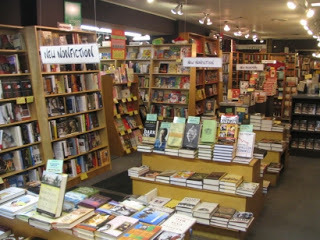
I’m not going to deal with the right or wrong of this situation. Publishers have to worry about profits, like any other business, and they can also be short-sighted and foolish, like any other business. This is, unfortunately, the reality that writers live with today, and the time allowed to build an audience is shorter than ever. I want to talk about what this means to readers and what they can do to prevent their favorite authors from disappearing in front of their eyes.
Over 70,000 books are traditionally published a year. 750,000 are self published. Less than 10 percent of the traditionally published sell more than 100,000 copies. That means there are 63,000 traditionally published books per year that don’t sell very many copies. Of the self published, the average sells less than 100 copies. Less than five percent of the people who call themselves authors make a living from their books alone. These are the facts your favorite novelists live with daily, and even if they are among the lucky few who are selling enough right now to be successful, they always know that can change in a short time, leaving them another of the writers stranded. This is why authors sometimes go a little crazy and frantic in their efforts at promotion, and why some get a little nuts about vicious reviews that slam their books in a public forum because people don’t like the price or cover (things over which the author has no control) or the protagonist’s name or the color of his/her eyes. I’m not trying to justify these authors when they overreact and behave badly. As you know if you’ve followed my blog or my posts at Writers Who Kill and The Stiletto Gang, I’m appalled at some of that bad behavior. I simply point out that most authors live in some kind of fear most of the time.
Novelists lose their livelihood when their books are dropped by a publisher, but readers lose their authors. I loved the work of one well-known author. Suddenly, you couldn’t find any more books in that series with those characters. After a delay, the author was back under a different name with a different series and different characters. I also like the new one, but I’d love to see new books in the old series. At Malice Domestic this year, audience members asked a panel of authors when they would write new books in long-gone series. The writers replied that they also loved those characters, but they had to write what publishers would buy. Margaret Maron and Donna Andrews both pointed out that, though they loved those earlier characters, they supported themselves with their writing and had to write what would pay their mortgages. So there will be no more books in Maron’s Sigrid Harald series or Andrews’ Turing Hopper series. And you could hear the groans of disappointment in the audience.

So, what can the reader do to make sure that her/his favorite author can keep writing books about his/her favorite characters? I’ve talked some about this before, but it bears repeating. First of all, of course, buy the books. Buy them for yourself and to give as gifts. Buy them from brick-and-mortar bookstores, if you can. If the bookstores don’t have your authors’ books, ask them to order them. But if you can’t buy them at a bookstore because of lack of stores in your area or because you really need the super discounts, buy them online. Buying books is the best thing you can do to help your favorite authors survive.
But buying at used bookstores will not help in this effort. That’s not a putdown of those who buy at used bookstores. I use them to find out-of-print books often. However, be aware that buying a used copy of a recently published book means the author and publisher get nothing for it, and your sale will not count to keep that author’s books being published. If you can’t afford to buy new books, request that your library buy them and check them out when the library does. Multiple times. Even if you buy X’s new book, still go to the library and request/check it out. Libraries are vital to the survival of midlist authors, a set that includes many of our favorite writers who aren’t Steven King or J.K. Rowling. Vote to support libraries also. They are as endangered as many of our favorite authors, and I believe free public libraries are of vast importance to a free, literate society.

Secondly, tell people about novelists you like. Word of mouth is the most effective method of selling books. Unfortunately, it’s one that writers and publishers have little control over. I have seen for myself again and again how one person who liked my first book would mention it on Facebook or Twitter and that would immediately lead to another person buying it and liking it. Your recommendations of books to your libraries, bookstores, and friends and family are the most powerful way you can help keep the books you love coming to you each year.
Reviews are another way to spread the word about books you love. For those who like to write, there are book blogs and other spots that take guest reviews, and writing one of these would be a lovely thing to do. But you may be a reader who feels shy putting words on the page for the general public to read. Hit the LIKE button on Amazon for books you enjoyed. Agree with the tags (if they aren’t designed to hurt the author—some on Amazon are, lately). This helps the book be found by readers looking for the elements this book has. Write a two- or three-sentence review. Just list a couple of things you really liked—realistic characters, suspense, humor, etc. All of these things help this book show up when readers are looking for good books of this type. Copy and paste your review to Goodreads or the other reading communities, such as Library Thing. It needn’t take a lot of effort or time.
For your very favorite writers, the ones you hate to think of living without, consider becoming members of that author’s “street team.” That’s a term I’ve stolen from the music world to use in the workshops I give authors on how to promote their books so that new readers can find them. All it means is that you are a superfan who follows your author’s blog and comments on it, who helps to promote appearances by your author in your area and encourages people to attend, who boosts that new book you’ve been eagerly waiting for on Facebook, Twitter, and any other social media you’re on. Every author needs a street team to help him or her. Become a part of the street team for the authors you most love.
A reader doesn’t have to be powerless in today’s Internet-connected world. You can help the sales of authors you don’t want to see disappear before your eyes as you wait eagerly for their next books. In the process, you may make new friends, and you will surely find yourself listed when your beloved author is thinking about the blessings in her/his life. Let other readers know about these things that they can do, also. After all, there’s nothing worse for a reader than losing the continued work of an author you love.
Published on October 15, 2012 08:26
October 3, 2012
Off to Bouchercon in Cleveland!


I'm off to Bouchercon in Cleveland. Bouchercon is the big world mystery conference. This year its guests of honor feature Elizabeth George, Robin Cook, Mary Higgins Clark, Les Roberts, Doris Ann Norris, and John Connolly. Truly a stellar group! Other notable attendees include Steve Hamilton, Sara Paretsky, Charlaine Harris, Donna Andrews, Heather Blake, Cara Black, Julie Hyzy, Jan Burke, Alafair Burke, Robert Olen Butler, Michael Connelly, Charles and Caroline Todd, Val McDermid, And of course, the great Jungle Red Writers of the blog of the same name--Julia Spencer-Fleming a nominee for the Anthony Best Book Award), Roberta Isleib/Lucy Burdette (a nominee for the Anthony Best Short Story Award), Deborah Crombie, Hank Phillippi Ryan, Hallie Ephron, Rosemary Harris, and Rhys Bowen. Bouchercon will be a hive of famous and wonderful writers!
In addition to the Anthony Awards banquet, Bouchercon will offer the Shamus Awards banquet, where all the awards for best private eye novels and short stories are given. The opening ceremonies will be at the Rock and Roll Hall of Fame. And the panels are many and incredible. The big problem is that there are so many I want to attend that are taking place at the same time. In the evening, different publishers, magazines, and other entities of the mystery world host parties and receptions.
This will be my very first Bouchercon, and I'm excited to attend. I'll try to post some photos and a report on the conference after I return.
On to Cleveland!
Published on October 03, 2012 17:06
September 25, 2012
Book Promotion 101
I'm giving a workshop on Thursday, September 27 from 6:00-8:00 pm at Mysteryscape, a new bookstore in Overland Park, Kansas. I've had a lot of requests for information on how to promote a book, and this seemed the simplest way to deal with them. Since Mysteryscape was willing to partner with me, I've been able to keep the cost very low, just $25 to cover costs of materials. (I will be giving participants a large packet of informational handouts of information I've gathered in the process of learning how to promote my books.)
Writers often find the hardest part of publishing is marketing. It's tough for artists who are suddenly thrust into the business model. It's a steep learning curve, and I'll share the things it took me months to find out and figure out.
I'm keeping the size of the workshop limited to provide a better learning environment. There a few slots left open, so if you're interested, send me an email or give me a call.
Book Promotion 101: How to Create Buzz for Your Book6:00-8:00 p.m., Thursday, September 27Mysteryscape, 7309 West 80th Street, Overland Park, KS 66204$25.00Space is limited. Please RSVP 816-333-6349 lindalynetterodriguez@gmail.comPublishing is changing. With digital publishing, books never really go out of print. Yes, the initial weeks of a book’s life are still important in building publicity momentum, but book promotion has become something authors must learn to deal with year round.
· Increase and diversify the publicity your book receives· Learn how to effectively use social media · Decide which types of promotion work best for you and your book· Plan a realistic schedule for a year of promotion
About the presenter:Linda Rodriguez’s Every Last Secret (St. Martin’s Press/Minotaur Books) won the Malice Domestic Best First Traditional Mystery Novel Competition. It was selected by Las Comadres National Book Club, which held a national teleconference with club members about the book. Every Last Secret was also a Barnes & Noble mystery pick for the month of April. It received more than twenty print and book-blog reviews, including Publishers Weekly, Kirkus, and Library Journal. One newspaper review was picked up by the AP and published in 17 other newspapers across the country. Linda has done 24 guest blogs and blog interviews about Every Last Secret, as well as a number of podcasts and radio interviews around the country and in other countries, as well. Every Last Secret was chosen by Kansas City Live TV-41NBC as the kick-off book for their monthly book club and has been selected by library and community book clubs around the country as a book to read and discuss.
Her second novel, Every Broken Trust (St. Martin’s Press/Minotaur Books), will be published May 7, 2013. For her books of poetry, Skin Hunger (Scapegoat Press) and Heart’s Migration (Tia Chucha Press), Rodriguez received numerous awards, including Midwest Voices & Visions Award, Elvira Cordero Cisneros Award, Thorpe Menn Award, KCArtsFund Inspiration Award, and Ragdale and Macondo fellowships.

Writers often find the hardest part of publishing is marketing. It's tough for artists who are suddenly thrust into the business model. It's a steep learning curve, and I'll share the things it took me months to find out and figure out.
I'm keeping the size of the workshop limited to provide a better learning environment. There a few slots left open, so if you're interested, send me an email or give me a call.
Book Promotion 101: How to Create Buzz for Your Book6:00-8:00 p.m., Thursday, September 27Mysteryscape, 7309 West 80th Street, Overland Park, KS 66204$25.00Space is limited. Please RSVP 816-333-6349 lindalynetterodriguez@gmail.comPublishing is changing. With digital publishing, books never really go out of print. Yes, the initial weeks of a book’s life are still important in building publicity momentum, but book promotion has become something authors must learn to deal with year round.
· Increase and diversify the publicity your book receives· Learn how to effectively use social media · Decide which types of promotion work best for you and your book· Plan a realistic schedule for a year of promotion
About the presenter:Linda Rodriguez’s Every Last Secret (St. Martin’s Press/Minotaur Books) won the Malice Domestic Best First Traditional Mystery Novel Competition. It was selected by Las Comadres National Book Club, which held a national teleconference with club members about the book. Every Last Secret was also a Barnes & Noble mystery pick for the month of April. It received more than twenty print and book-blog reviews, including Publishers Weekly, Kirkus, and Library Journal. One newspaper review was picked up by the AP and published in 17 other newspapers across the country. Linda has done 24 guest blogs and blog interviews about Every Last Secret, as well as a number of podcasts and radio interviews around the country and in other countries, as well. Every Last Secret was chosen by Kansas City Live TV-41NBC as the kick-off book for their monthly book club and has been selected by library and community book clubs around the country as a book to read and discuss.
Her second novel, Every Broken Trust (St. Martin’s Press/Minotaur Books), will be published May 7, 2013. For her books of poetry, Skin Hunger (Scapegoat Press) and Heart’s Migration (Tia Chucha Press), Rodriguez received numerous awards, including Midwest Voices & Visions Award, Elvira Cordero Cisneros Award, Thorpe Menn Award, KCArtsFund Inspiration Award, and Ragdale and Macondo fellowships.
Published on September 25, 2012 10:54
September 22, 2012
That Old Black Dog of Fear

People are afraid of many things. The saddest is the fear of black cats and dogs. Because of this fear, more black cats and dogs are euthanized by kill shelters than other colors. People are afraid to adopt them because they’re black, and these shelters, which usually have to euthanize because they’re public shelters and have to keep taking in all surrendered/lost pets brought to them, must kill them when they’ve been there too long and space gets short. Because of this problem, many of these shelters periodically offer “sales” on black cats and dogs—half-off adoption fees, very low adoption fees, even sometimes no adoption fees.
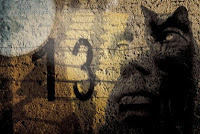 The prejudice against black cats and dogs goes back a long way to old superstitions about them being the devil’s animals and being bad luck. I could trace these legends back to their beginnings in the battle between religions where the animals were simply used as props and propaganda weapons by the warring sides, but I’m not going to burden my blog with that today. It’s a shame that companion animals have to be dragged into our human quarrels in this way.
The prejudice against black cats and dogs goes back a long way to old superstitions about them being the devil’s animals and being bad luck. I could trace these legends back to their beginnings in the battle between religions where the animals were simply used as props and propaganda weapons by the warring sides, but I’m not going to burden my blog with that today. It’s a shame that companion animals have to be dragged into our human quarrels in this way. The only thing sadder than a rejected black pet is an older cat or dog who’s also black. No one wants these. You combine the prejudice against older animals with the prejudice against black animals and come up with a stone wall these cats and dogs can’t get over, no matter how sweet, cute, bright, well-behaved, and gentle they are. If you talk to anyone in the rescue business or look on any of their websites, you’ll quickly find that this is a sad, basic truth in the world of those who care for and try to find permanent homes for older, black pets.
The only thing sadder than a rejected black pet is an older cat or dog who’s also black. No one wants these. You combine the prejudice against older animals with the prejudice against black animals and come up with a stone wall these cats and dogs can’t get over, no matter how sweet, cute, bright, well-behaved, and gentle they are. If you talk to anyone in the rescue business or look on any of their websites, you’ll quickly find that this is a sad, basic truth in the world of those who care for and try to find permanent homes for older, black pets.The silliest part of it, to me, is that the pet doesn’t even have to be all black, certainly not if it’s a dog. Check out your local humane shelter’s “black dog sale,” and you’ll find that dogs that are only part black are included in the sale because they’re included in people’s prejudices against black animals. My own rescue dog is a Plott hound with the typical brindle brown coat, but because he has a black saddle on his back, he was deemed a black dog and unadoptable.
 Rescue and shelter animals have enough prejudice against them. Every year, approximately 3-4 million cats and dogs are euthanized in shelters. These are animals people gave up and threw out, or the offspring of such animals. It’s getting worse because many families have lost homes and been forced to move to apartments that refuse animals, causing them to surrender family pets if they can’t find friends to take them. Yet still, people pay big bucks to buy dogs and cats from breeders—and oddly enough, many of those wanted, purchased purebred dogs and cats (but more often dogs) find their ways into shelters around the country. I’ve been taking in shelter dogs all my adult life, and I’ve noticed a big change there. It used to be rare to find a purebred animal at a shelter. Now, they’ve all got some, and often quite a number of them.
Rescue and shelter animals have enough prejudice against them. Every year, approximately 3-4 million cats and dogs are euthanized in shelters. These are animals people gave up and threw out, or the offspring of such animals. It’s getting worse because many families have lost homes and been forced to move to apartments that refuse animals, causing them to surrender family pets if they can’t find friends to take them. Yet still, people pay big bucks to buy dogs and cats from breeders—and oddly enough, many of those wanted, purchased purebred dogs and cats (but more often dogs) find their ways into shelters around the country. I’ve been taking in shelter dogs all my adult life, and I’ve noticed a big change there. It used to be rare to find a purebred animal at a shelter. Now, they’ve all got some, and often quite a number of them.I can’t stress enough how important I feel it is to give homes to shelter/rescue cats and dogs, if you can and if you are looking for a pet. They make grateful, loyal, and affectionate pets, and you’re quite literally saving a life when you do. And while you’re looking for a good pet at your local shelter, please, please don’t bypass the older, black animals in your search. Older, black cats and dogs are at the highest risk of being euthanized because no one wants them. Take one home and bask in its love and affection. You’ll be glad you did as the years in company with your faithful pet slip past.
Published on September 22, 2012 09:25



